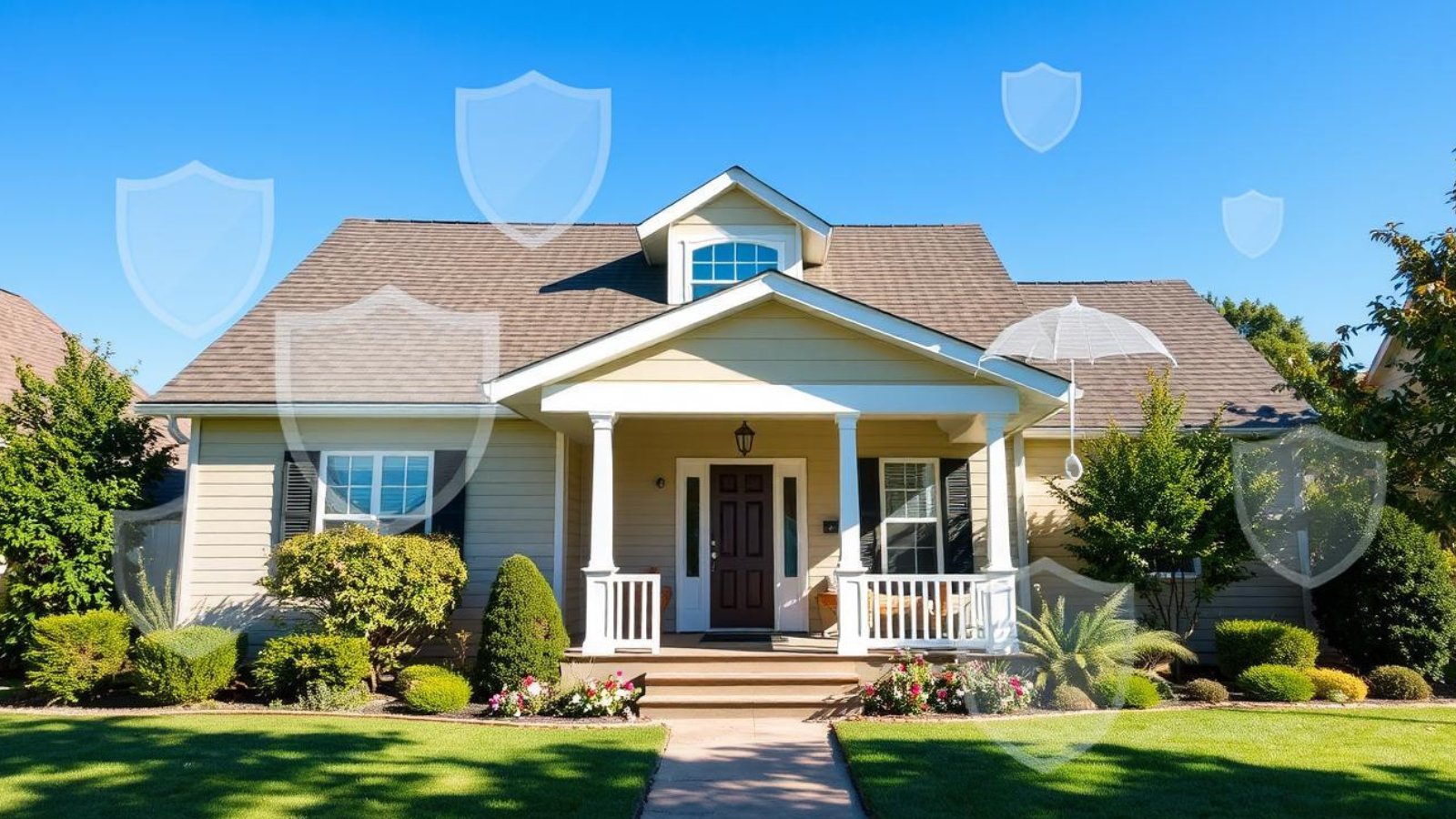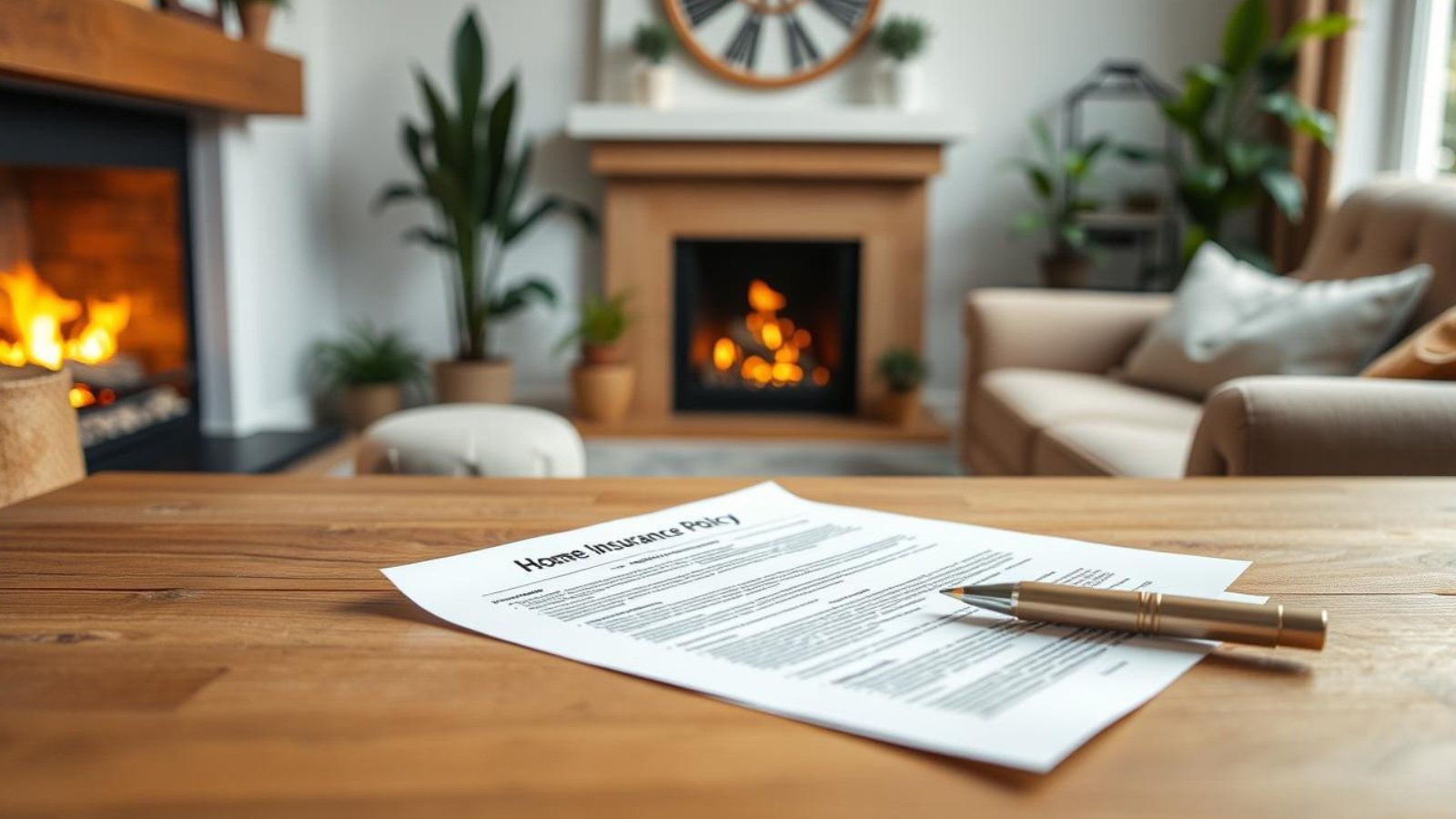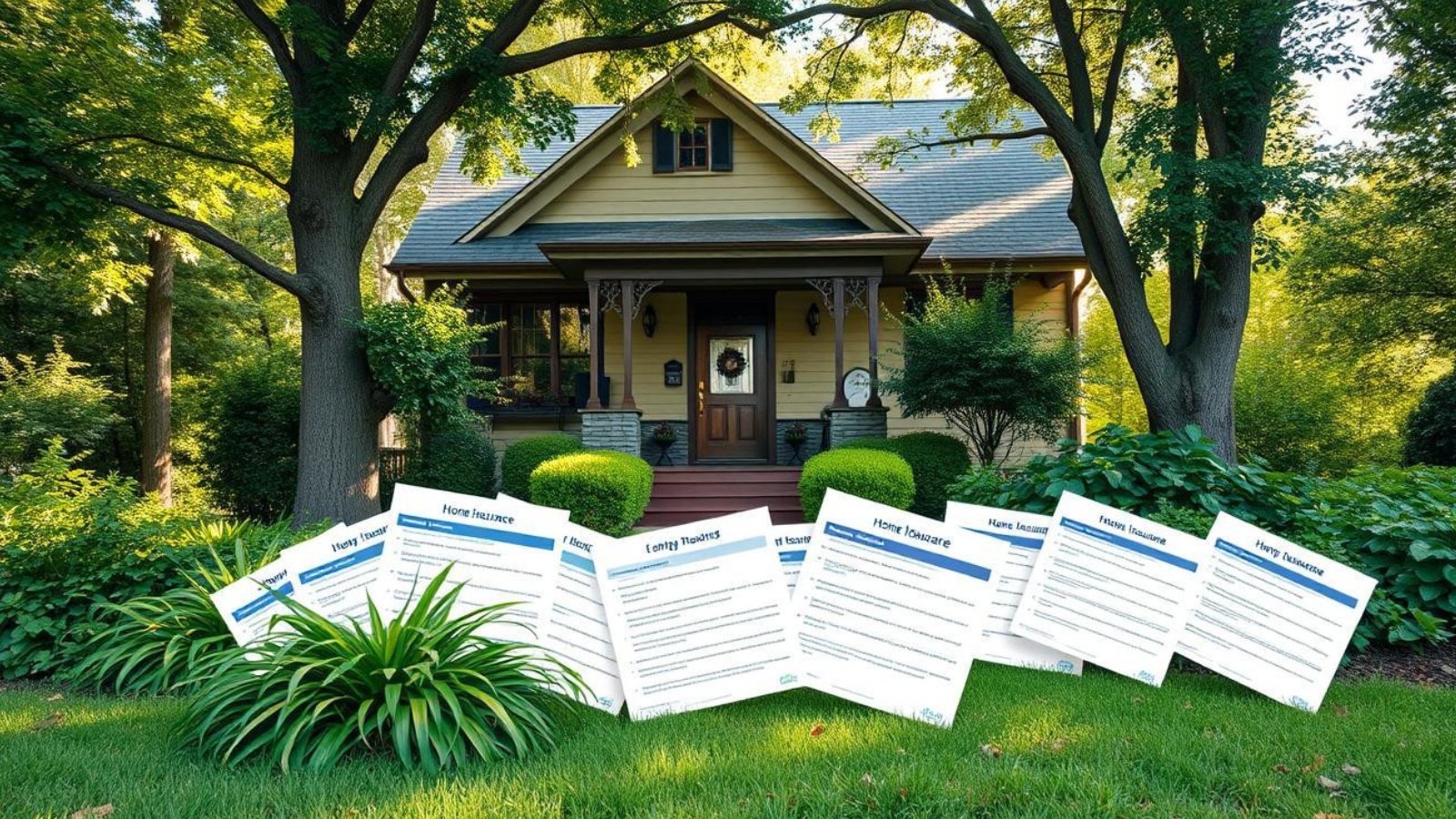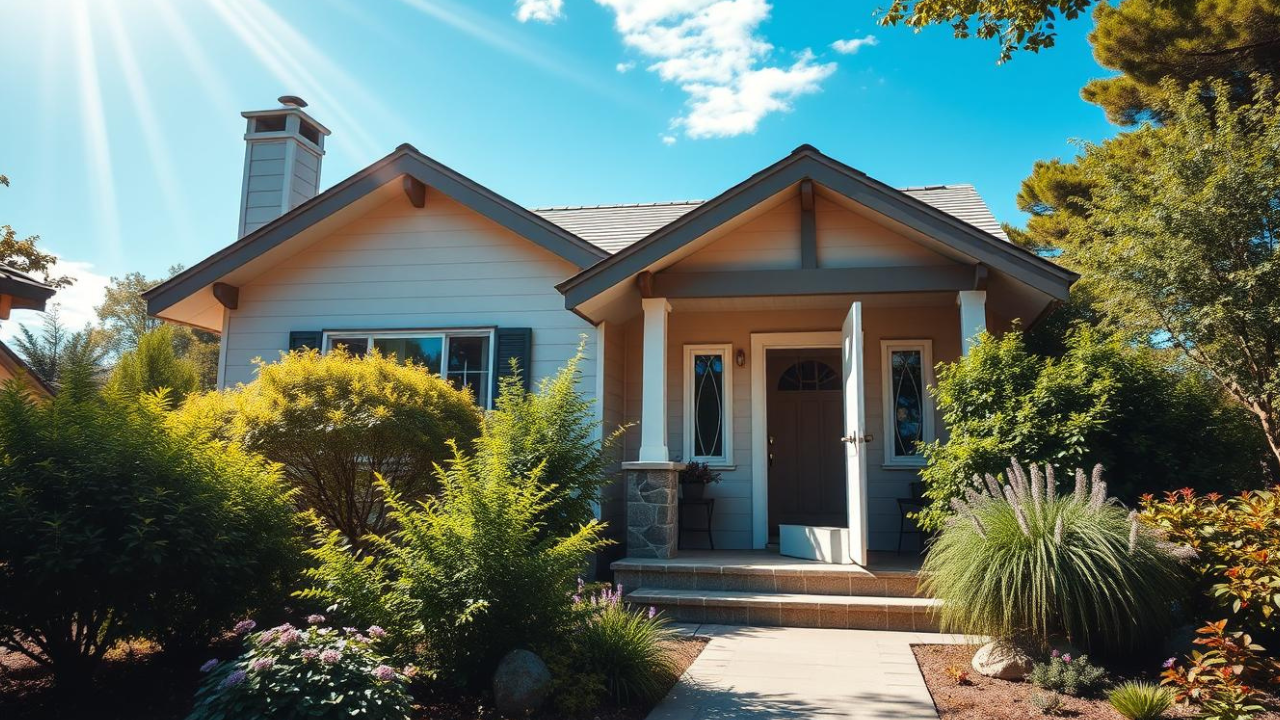Find the Right Home Insurance Coverage for You

Protecting your home and finances is key. With many insurance companies and policies, it’s hard to know what to choose. When looking for insurance quotes, think about what you need and find a policy that matches.

A cozy suburban home with a welcoming front porch, surrounded by a well-maintained garden, under a clear blue sky; overlayed with transparent symbols of protection like shields and umbrellas, representing safety and security, set in a harmonious landscape.
Home insurance protects you from unexpected events. Finding the right coverage brings peace of mind. We’ll show you how to find the best home insurance, covering the basics and what affects your premiums. This will help you choose the right policy when comparing quotes.
Understanding Home Insurance Basics
Protecting your home and personal items is key. A good home insurance policy is essential. It covers damages to your home and belongings, and liability for accidents on your property. Homeowners insurance helps protect against natural disasters, theft, and unexpected events.
It’s important to know what your policy covers. Home insurance policies include dwelling, personal property, and liability coverage. Dwelling coverage protects your home’s structure. Personal property coverage guards your belongings. Liability coverage helps if you’re sued for accidents on your property.
What Home Insurance Actually Covers
Home insurance usually protects against fires, lightning, and windstorms. It also covers theft, vandalism, and malicious acts. Many policies even cover living expenses if you have to move temporarily because of home damage.

A detailed home insurance policy document resting on a wooden table, surrounded by a cozy living room setting with a warm fireplace, a plush sofa, and decorative houseplants, soft natural light illuminating the scene.
Common Types of Coverage
- Dwelling coverage
- Personal property coverage
- Liability coverage
- Additional living expenses coverage
In summary, a good home insurance policy is crucial. Knowing what your policy covers helps you make smart choices. This ensures you have enough insurance for your needs.
Evaluating Your Home Insurance Needs
To find the right home insurance policy, you need to think about a few things. First, consider the value of your home and how much it would cost to rebuild. Also, think about the value of your personal belongings. Your lifestyle and where you live are important too. For example, if you live in a place that’s often hit by natural disasters, you might need extra coverage.
When picking a home insurance policy, it’s smart to compare home insurance quotes from different insurance companies. This way, you can find the best deal that fits your needs and budget. Start by looking into different insurance companies and their policies. Then, contact them for quotes.
Here are some key things to think about when figuring out your home insurance needs:
- Value of your home and personal property
- Cost of rebuilding your home
- Risks associated with your location
- Your lifestyle and needs

A cozy home surrounded by lush greenery, showcasing a diverse range of home insurance policy documents and coverage options spread across the front yard, with a warm, inviting atmosphere and soft sunlight filtering through trees.
By looking at these factors and comparing home insurance quotes from various insurance companies, you can pick the right home insurance policy for you. Make sure to read the policy details carefully and ask any questions before you decide.
| Insurance Company | Policy Details | Quote |
|---|---|---|
| Company A | Covers home and personal property | $1000/year |
| Company B | Covers home, personal property, and liability | $1500/year |
Different Types of Home Insurance Policies
Protecting your home is crucial. You need the right insurance from trusted companies. A homeowners policy helps protect your property and covers accidents on your land.
There are many home insurance policies out there. Each offers different levels of coverage and benefits. Knowing the differences helps you choose the best policy for you.
HO-1: Basic Form Policy
The HO-1 policy covers basic risks like fire and windstorms. It’s cheaper but might not fully protect your home and stuff.
HO-2: Broad Form Policy
The HO-2 policy covers more risks than HO-1, including ice and snow damage. It’s more detailed but still has some limits.
HO-3: Special Form Policy
The HO-3 policy covers all risks except those it excludes. It’s the most popular because it offers full protection for your home and belongings.
HO-5: Comprehensive Form Policy
The HO-5 policy covers all risks, including floods and earthquakes. It’s the priciest but offers the most protection.
Choosing the right homeowners policy is key. Think about what you need and pick a policy that fits. Knowing the options helps you find the best policy for your home and budget.
How Much Home Insurance Coverage Do You Need?
To find the right home insurance quotes, think about your home’s value, rebuilding costs, and personal property value. Your financial situation and how much you can spend on premiums matter too. When looking at your insurance policy, consider what coverage is most important to you, like liability and extra living expenses.
Understanding what your homeowners insurance covers is key. A standard policy usually protects your home and belongings, and covers liability for accidents on your property. But, it’s important to check your policy to make sure you have enough coverage. You might need extra coverage for things like floods or earthquakes, depending on where you live.
- Replacement cost of your home
- Value of your personal property
- Liability protection
- Additional living expenses
By carefully looking at these factors and your insurance policy options, you can choose the right homeowners insurance coverage for you.
Factors That Affect Your Insurance Premiums
Many things can change how much you pay for home insurance. Knowing these can help you choose the best homeowners insurance. The cost can go up or down based on where you live, your home’s age and build, and its safety features.
Homes near natural disaster zones or in high-crime areas might cost more to insure. Newer homes often have lower premiums because they’re safer and less likely to get damaged.
Location and Environmental Risks
Being close to the coast or wildfire zones can raise your insurance costs. These areas might need extra coverage or have higher premiums because of the risks.
Home Construction and Age
The materials and age of your home also matter. Homes made with fire-resistant materials or recently updated might get lower premiums.
Security Features and Safety Measures
Adding security like alarm systems or smoke detectors can lower your premiums. Improving your home’s safety, like with storm shutters or a reinforced roof, can also save you money. Knowing what affects your premiums helps you find ways to cut costs and get the right insurance for your home.
Additional Coverage Options to Consider
When looking for home insurance quotes, think about extra coverage options. A homeowners insurance policy helps protect against many risks. But, you might need more for certain items or events.
Some extra coverage options to think about include:
- Flood insurance to protect against flood damage
- Earthquake insurance to protect against earthquake damage
- Umbrella insurance to provide extra liability coverage
- Coverage for high-value items, such as jewelry or artwork
Think about your specific needs and risks when evaluating these options. For example, if you live in a flood-prone area, you might need flood insurance. By choosing the right extra coverage, you can protect your home and belongings well.
Make sure to review your home insurance quotes carefully. Ask questions if you’re not sure about anything. Understanding your options and choosing the right coverage can give you peace of mind and financial protection for your home.
| Additional Coverage Option | Description |
|---|---|
| Flood Insurance | Protects against flood damage |
| Earthquake Insurance | Protects against earthquake damage |
| Umbrella Insurance | Provides extra liability coverage |
Tips for Comparing Home Insurance Quotes
When looking for homeowners insurance, it’s key to compare quotes from various companies. This helps you find the best coverage for your needs. Comparing quotes can seem tough, but there are tips to make it easier. Look at policy details like coverage limits, deductibles, and what’s not covered to ensure you’re getting the right protection.
Home insurance companies offer different policies. It’s important to know what each policy includes. When comparing quotes, consider these factors:
- Coverage limits: Make sure the policy covers your home and belongings enough.
- Deductibles: Check the deductible amount and how it changes your premium.
- Exclusions: Review what’s not covered to understand the policy fully.
Be cautious of red flags like low coverage limits or high deductibles in quotes. Ask insurance providers about the policy, claims process, and available discounts. By researching and comparing quotes, you can find the best policy for your needs and budget.
Make sure to review each policy carefully and ask questions. This ensures you get the right coverage. With the right homeowners insurance, you can rest easy knowing your home and belongings are safe.
| Home Insurance Company | Coverage Limits | Deductibles |
|---|---|---|
| Company A | $200,000 | $1,000 |
| Company B | $300,000 | $500 |
| Company C | $250,000 | $1,500 |
Ways to Save on Your Home Insurance
When it comes to your home insurance policy, saving money is key. One smart way to cut down on insurance premiums is to bundle your policies. This means combining your homeowners insurance with other policies, like auto insurance, for a discount.
Another strategy is to raise your deductible. This will lower your insurance premiums. Just make sure you can afford the deductible if you need to make a claim. You might also get discounts, like a multi-policy discount or a claims-free discount, to lower your home insurance policy costs.
Here are some more tips to save on your homeowners insurance:
- Boost your home’s security with a security system or smoke detectors
- Choose impact-resistant roofing materials
- Keep your credit score high for lower insurance premiums
By using these tips, you can cut costs on your home insurance policy. This way, you’ll have peace of mind knowing your home is safe. Always check your policy and ask about discounts from your insurance provider.
Making Your Final Home Insurance Decision
After comparing home insurance quotes and picking a policy, it’s key to check the policy details. This ensures you have the right homeowners insurance for your home.
Look closely at your insurance policy. Check the coverage limits, deductibles, and what’s not covered. Knowing how to file a claim and what to expect is also important. This knowledge helps avoid surprises later.
Here are some key factors to consider when making your final decision:
- Policy terms and conditions
- Coverage limits and deductibles
- Claims process and procedure
- Payment plan options and flexibility
By carefully reviewing your home insurance quotes and policy terms, you can ensure you have the right homeowners insurance coverage for your needs and budget. Also, think about the insurance provider’s reputation and customer service. This ensures you get the best service.
Choosing the right insurance policy wisely will give you peace of mind. It protects your home and finances from unexpected events. Take your time to review your options and pick the homeowners insurance policy that suits your needs.
| Insurance Policy | Coverage Limits | Deductibles |
|---|---|---|
| Homeowners Insurance | $200,000 | $1,000 |
| Condo Insurance | $150,000 | $500 |
Common Home Insurance Mistakes to Avoid
It’s crucial to avoid common mistakes with your home insurance policy. You want to make sure your homeowners insurance covers your home and belongings well. This way, you can have peace of mind.
Some mistakes to steer clear of include underinsuring your home and not reading your policy terms. Also, don’t shop around for quotes. Avoid making claims for small damages and keep records of your belongings. These steps help ensure your insurance meets your needs.
Here are some more tips to remember:
- Review your policy regularly to ensure it still meets your needs
- Keep accurate records of your belongings and their value
- Shop around for quotes to find the best rate for your home insurance policy
By following these tips, you can avoid common home insurance mistakes. This ensures your homeowners insurance protects you well. Always read your policy terms carefully and ask questions if you’re unsure.
Conclusion: Securing Your Home’s Future with the Right Insurance
Throughout this article, you’ve learned how important it is to find the right home insurance. It’s key to protect your most valuable asset – your home. By knowing the different policies and what you need, you can get the right coverage.
Remember, your home is a big investment. It’s vital to protect it with the right insurance. Take time to review your policy and understand the claims process. Work with a trusted provider to create a plan that fits your budget and lifestyle. With the right insurance, you can feel secure about your home’s future, no matter what happens.
What does home insurance actually cover?
Home insurance covers damage to your home and personal items. It also protects you if someone gets hurt on your property. This includes protection from natural disasters, theft, and other unexpected events.
What are the common types of home insurance coverage?
There are several types of home insurance policies. HO-1 is the basic form, HO-2 is the broad form, HO-3 is the special form, and HO-5 is the comprehensive form. Each offers different levels of protection.
Why is home insurance important?
Home insurance protects you from unexpected events. It helps keep your home and belongings safe. It also protects you from liability for accidents on your property.
How do I determine how much home insurance coverage I need?
To figure out how much coverage you need, consider your home’s value and rebuilding cost. Think about the value of your belongings too. Your financial situation and location risks also matter.
What factors affect my home insurance premiums?
Several things can affect your premiums. Your location, home’s construction and age, and safety features are key. Homes in disaster-prone or high-crime areas often have higher premiums.
What additional coverage options should I consider?
You might want extra coverage like flood or earthquake insurance. Umbrella insurance and coverage for valuable items like jewelry or artwork are also good ideas.
What should I look for when comparing home insurance quotes?
When comparing quotes, look at coverage limits, deductibles, and what’s excluded. Watch out for low limits or high deductibles, which could be red flags.
How can I save on my home insurance premiums?
To save, consider bundling policies or raising your deductible. Improving your home’s security can also help. Look for discounts like multi-policy or claims-free discounts.
What common home insurance mistakes should I avoid?
Avoid underinsuring your home and not reading policy terms. Don’t shop around or make claims for small damages. Keep records of your belongings.
If you have any questions or concerns about our Article, please reach out to our support team. We’re here to help you!








